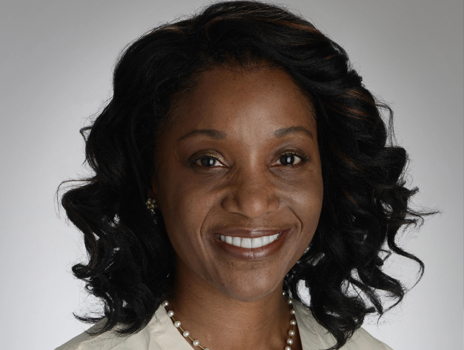April 22, 2024
The challenge with ovarian cancer lies in its elusive nature. Unlike some types of cancer that may have noticeable symptoms or have specific biomarkers for early detection, ovarian cancer often develops silently and without clear warning signs in its early stages. By the time symptoms do appear, the cancer is often at an advanced stage, making it more difficult to treat effectively. Over 80% of cases are already at stage III or IV before diagnosis.
Diane Mahoney, PhD, APRN, an Assistant Professor in the School of Nursing and member of The University of Kansas Cancer Center’s Cancer Prevention and Control research program, wants to change that. Central to her research focus is the need for early detection methods in ovarian cancer.
"There's a race to understand how we can screen all women earlier for ovarian cancer," she explained. "If we could diagnose women earlier, we could save many lives."
However, significant disparities exist, particularly among underrepresented women. While strides have been made in treating ovarian cancer over recent decades, progress hasn't been uniform across all racial and ethnic groups. For instance, from 1975 to 2016, the 5-year relative survival rate for ovarian cancer rose from 33% to 48% among non-Hispanic White women, contrasting with a decline from 44% to 41% among African American women. Dr. Mahoney’s challenge lies in investigating methods of early detection for all women while addressing the unique needs of these subpopulations. She aims to not only advance ovarian cancer detection but also to ensure equitable access to interventions for all women.
There's a race to understand how we can screen all women earlier for ovarian cancer. If we could diagnose women earlier, we could save many lives. Diane Mahoney, PhD, APRN
Unraveling microbial mysteries
Even though ovarian cancer only makes up 2% of all female cancers in the United States, it's the fifth leading cause of cancer-related deaths for women. The chances of surviving ovarian cancer are low, especially if it is advanced. The good news is that ovarian cancer can be cured in 90% of cases if caught early. In collaboration with researchers at The University of Kansas Cancer center, Dr. Mahoney is spearheading an effort to develop a minimally invasive test that could identify women with early-stage disease by investigating the role of the human microbiome.
Dr. Mahoney and her team leveraged the University of Kansas Medical Center’s Biospecimen Repository care facility to obtain samples of plasma blood from different groups of women: some with ovarian cancer, some with other types of cancer, some with non-cancerous gynecologic conditions and some healthy women. They used a special method to study the microbes in these blood samples. After isolating and evaluating 339 bacteria, they compared the bacteria in women with ovarian cancer to those without it.
Women diagnosed with epithelial ovarian cancer, particularly those with high-grade serous ovarian carcinoma, showed significantly distinct differences in their microbe make-up compared to the other groups. Notably, bacteria such as Brevibacterium, Chloronema, Facklamia, Zymomonas and Sutterella showed possible ties to the epithelial ovarian cancer blood samples. According to Dr. Mahoney, these bacteria might be a clue that someone has ovarian cancer or is at increased risk of developing the disease.
“Just imagine if we had a way to conduct a simple, noninvasive blood test that could identify who is at risk for developing ovarian cancer,” Dr. Mahoney said. “If we can learn to spot these bacteria early, clinicians might be able to catch ovarian cancer earlier, or we can treat with probiotics.”
Dr. Mahoney presented these findings at the 2024 American Association for Cancer Research (AACR) annual meeting.
Mastering a new language
In addition to her research, Dr. Diane Mahoney's commitment to patient care extends beyond the laboratory. Years ago, as a nurse practitioner, she recognized the growing need to connect with Spanish-speaking patients in her community. Determined to bridge the communication gap and provide equitable care, Dr. Mahoney started taking Spanish lessons.
With just a few lessons under her belt, Dr. Mahoney interviewed, and was subsequently hired, at a Spanish-speaking clinic.
“It was challenging to keep up in the beginning, but the clinic felt like home,” Dr. Mahoney said.
Encouraged by this sense of connection and driven by her passion for patient care, she dedicated herself to mastering the language. She immersed herself in Spanish courses, ultimately becoming fluent in the language. Dr. Mahoney's journey underscores the importance of empathy, cultural competence and a willingness to step outside one's comfort zone in providing patient-centered care.
“As an investigator from an underrepresented background, I do not make assumptions about the people I’m trying to treat,” Dr. Mahoney said. “I love having real conversations with real patients and their families.”
